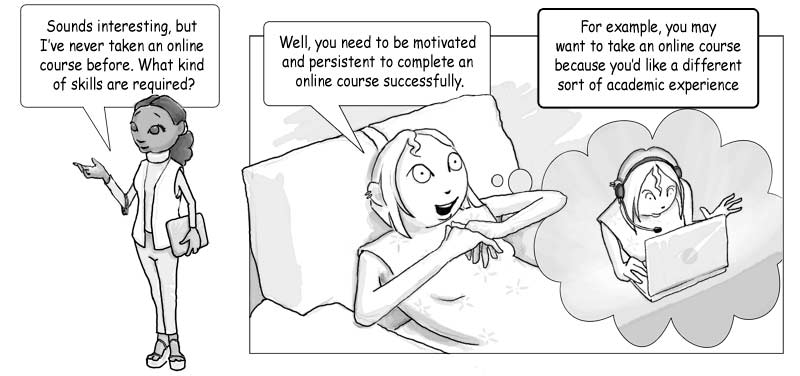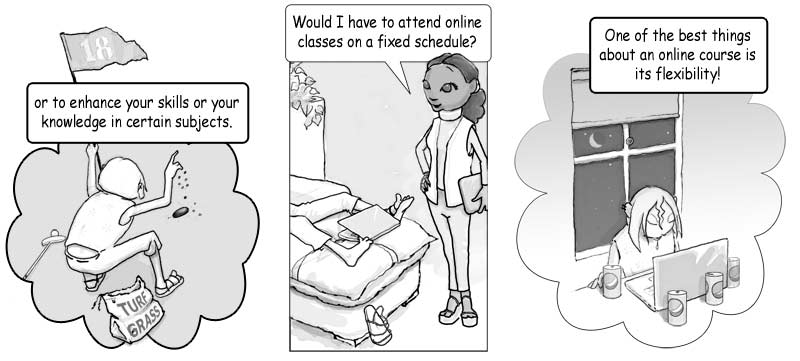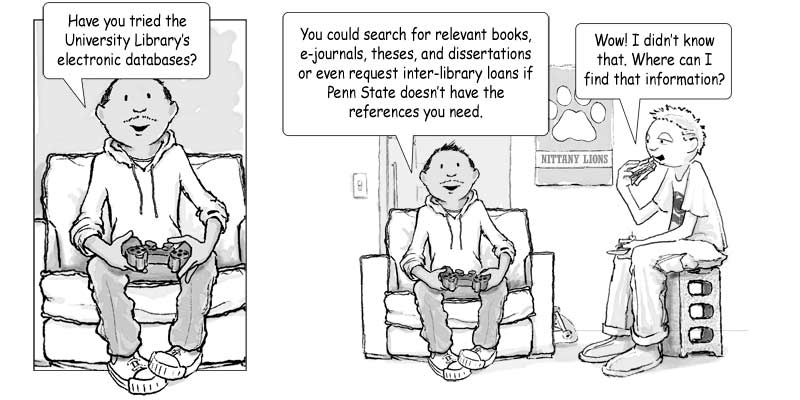
iStudy for Success!
Online learning tutorials for essential college skills.
iStudy would like to acknowledge Jackie Ritzko for revising the content of this tutorial.
This tutorial provides an introduction to help you to:

By the time you finish the Online Readiness tutorial, you will be able to:
The information in this tutorial has been divided into several sections. The recommended sequence is as follows:
Note: All external links in this tutorial will open in a new window or tab.
Before enrolling in an online course, you should first assess your readiness for stepping into the online learning environment. Spend some time thinking about yourself as a learner and see whether your characteristics would help you be a successful online learner. Your answers to the following questions will help you determine what you need to do to succeed at online learning. Feedback provided after completing the self-assessment survey will also provide you with some information in terms of what you should expect from an online course.
Instructions: Click on the link below to assess the questionnaire.
Am I Ready?
Sage: Hi, Heather. I am thinking about taking an online course on World Technologies and Learning next semester.
Heather: Hey, study buddy! That's different...
Sage: The course is about examining the impact of learning technologies from email to online learning on world cultures from a socio-technical perspective. Wanna take it with me?
Heather: Sounds interesting, but I've never taken an online course before. What kind of skills are required?
Sage: Well. You need to be motivated and persistent to complete an online course successfully. For example, you may want to take an online course because you'd like a different sort of academic experience or to enhance your skills or your knowledge in certain subjects.
Heather: Would I have to attend online classes on a fixed schedule?
Sage: One of the best things about online course is its flexibility! You can access your course materials or respond to a post in a discussion forum anytime you want, based on your own schedule. Just make sure you manage your time well and submit your assignments before the deadlines since online courses take more time than you might imagine.
Heather: Great! Thanks for the advice, Sage. I'll have to think about it.




[top of page]
Different people take online courses for different reasons.
Distance education requires self-discipline and persistence. Hence, setting your own goals and purposes for your learning will help you to keep motivated to learn and to hold yourself responsible for proceeding throughout the online course period.
In order to succeed in online learning, you must devote a substantial amount of time and effort to studying and working on assignments. Expect to spend more time working on your assignments or online discussion forums for an online course than you would in a face-to-face course. An online learning environment depends heavily on text-based instruction and communication; as a result, it will take time for you to complete reading assignments and discussion posts, to create responses and reports, and to interact with your instructor and peers.
One benefit of online learning is the ability for you to set up your own studying schedule and pace. You should develop personal time management skills and a schedule to help you manage your time appropriately. By doing so you will be able to complete your tasks on time, instead of last minute rushes to meet deadlines. You should also evaluate your progress periodically.
Study habits are essential in online learning. Although research on learning styles is inconclusive, thinking about your learning style in advance will help you to understand your online learning and studying preferences. One approach is to divide learning styles into three categories: auditory, visual, and kinesthetic. Auditory learners talk out their problems while trying to solve them. Visual learners rely on drawing diagrams or pictures of concepts to make sense of important messages during their learning process. Kinesthetic learners attempt to understand concepts by doing things physically. It is recommended that you try different learning techniques or a combination of styles under different circumstances to enhance your online learning outcome.
Take the Learning Style Self-Assessment survey as a way to begin thinking about ways you learn best. You may not agree with the results of the survey and that's OK! The purpose of the survey is not to define you, it's to get you to think about yourself.
Learning Style Self-Assessment Survey
Familiarizing yourself with using computers and engaging in Web-related activities, as well as having access to the required hardware and tools, are critical factors in successful online learning. You should have some basic knowledge about how to:
Familiarizing yourself with those tools will help you reduce your frustration while engaging in online learning activities.
Jose: Hey, Brian. Have you found your references for writing up your paper for the online course assignment that's due in two weeks?
Brian: Oh right, Jose. I need your help on that. I don't really know where to find references for my paper. You have any suggestions?
Jose: Have you tried the University Library' electronic databases? You could search for relevant books, e-journals, theses and dissertations or even request inter-library loans if Penn State doesn't have the references you need.
Brian: Wow! I didn't know that. Where can I find that information?
Jose: Just go to the Libraries Web page, and look for "Information and Services" page. You'll find a lot of useful links. And make sure you cite your references properly in your paper to avoid plagiarism. That information's there,too.
Brian: Jose, you're such a great help! I will definitely look up the Libraries Web page. Umm...you want half a sandwich? Only missing one bite.



Awareness of available academic resources and technical support will help you solve problems you encounter throughout your online learning period.
[top of page]
You can access the University Libraries resources and services via your Penn State Access Account. The University Libraries have an "Information and Services" Web page with useful links for undergraduate students at Penn State to search for relevant information. With these links, you can research how to find books, theses, and journal articles on electronic databases, how to organize your research by using referencing software or appropriate citation styles, and how to make course reserves, obtain materials through interlibrary loan, or contact librarians. You may visit the Web site at https://libraries.psu.edu/services for more information.
If you are taking a World Campus online course, you may access the Penn State Outreach HelpDesk Web site for technical support by using your Penn State Access Account. The Outreach HelpDesk (http://student.worldcampus.psu.edu/technical-support/contact-us) can assist you with technical issues.
For non-World Campus online and blended (partially online) courses, the Information Technology Help Desk at Penn State offers a variety of consultation services to help you with your technical problems. You may call the ITS Helpline (814-865-HELP), e-mail the Penn State Help Request Portal (http://service.psu.edu/). You may also search the online ServiceNow Base (https://pennstate.service-now.com/help_portal/) for answers to technology questions.
Practicing good online etiquette, or "netiquette," will help you to effectively interact with your instructors and fellow students, as you will not be able to utilize body language clues to convey or read messages when communicating from a distance. It is easy to misread the intended tone of an e-mail.
Complete the True/False questions below to self-check if you are familiar with some basic concepts for online communication.
Online Etiquette T/F Questions
Your online instructors will help you to facilitate "learner-content and learner-instructor interaction" by keeping a balance between presenting packaged instructional materials to you and by interacting with you to assist you with relating new information to your own personal knowledge. They will further help you to respond to your application of new knowledge. In order to better promoting interaction between you and instructional content and interaction between your instructors and you, your distance education instructors are suggested to be "empathetic (Moore & Kearsley, 2005, p136)" to understand your personalities, to identify your needs, as well as to perceive your emotions so that instructors will be able to guide, to support, and to encourage your involvements in various forms of interactions and participation in distance education learning.
"Leaner-learner interaction" is the third distinct type of interaction in online courses. This kind of interaction is typically conducted via uses of different communication technologies, such as shared documents, teleconferences, videoconferences, web conferences, and threaded forum discussions embedded in learning management systems. You should try to interact with your peers by keeping discussion topics on track, relating discussions to particular instructional components, providing insightful comments to provoke deeper understanding and interpretation of the course content, as well as maintaining group harmony.
* Indicates that the original Website is no longer available.
The flexibility that allows you to arrange your own studying time and pace based on your own schedule.
It is your responsibility as a student/learner to be motivated and persistent throughout the course work in order to proceed and complete the course consistently and successfully.
Following are the assignments embedded in the Learning Online: Are You Ready? tutorial:
You can request students send you the results of both.
This tutorial should be used before or in conjunction with the Consuming and Creating in the Digital Age tutorial, as the ability to use and create digital materials is part of any online learning experience. The Time Management tutorial is also recommended.
OPTIONAL - Have students openly discuss previous online learning experiences and any difficulties they encountered.
These points are covered in the iStudy tutorial, but should be emphasized in any discussions.
Assessment criteria are as follows (instructors supply the percentage weights):
|
Where |
Domain |
Activities |
% |
|---|---|---|---|
|
iStudy Tutorial |
Knowledge |
The student has completed the questionnaire and survey. |
|
|
In-Class |
Application |
The student can engage in discussion of his/her perceived online learning strengths/weaknesses. |
|
|
In-Class |
Synthesis |
The student can reflect on his/her perceived online learning strengths/weaknesses by identifying his/her weaknesses as well as by making plans to eliminate those weaknesses. |
|
|
|
|
|
100% |